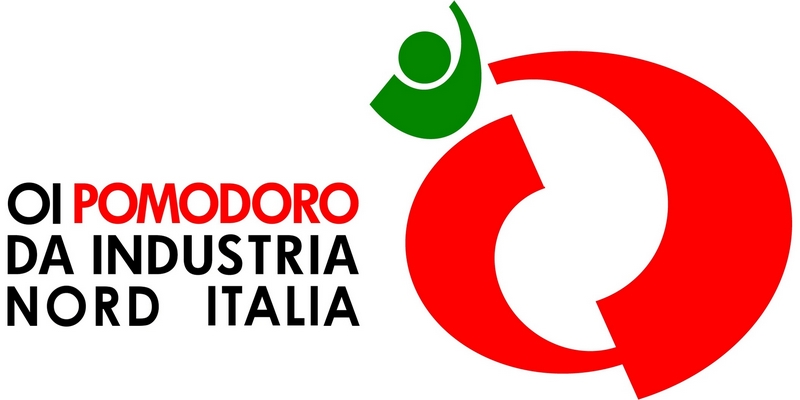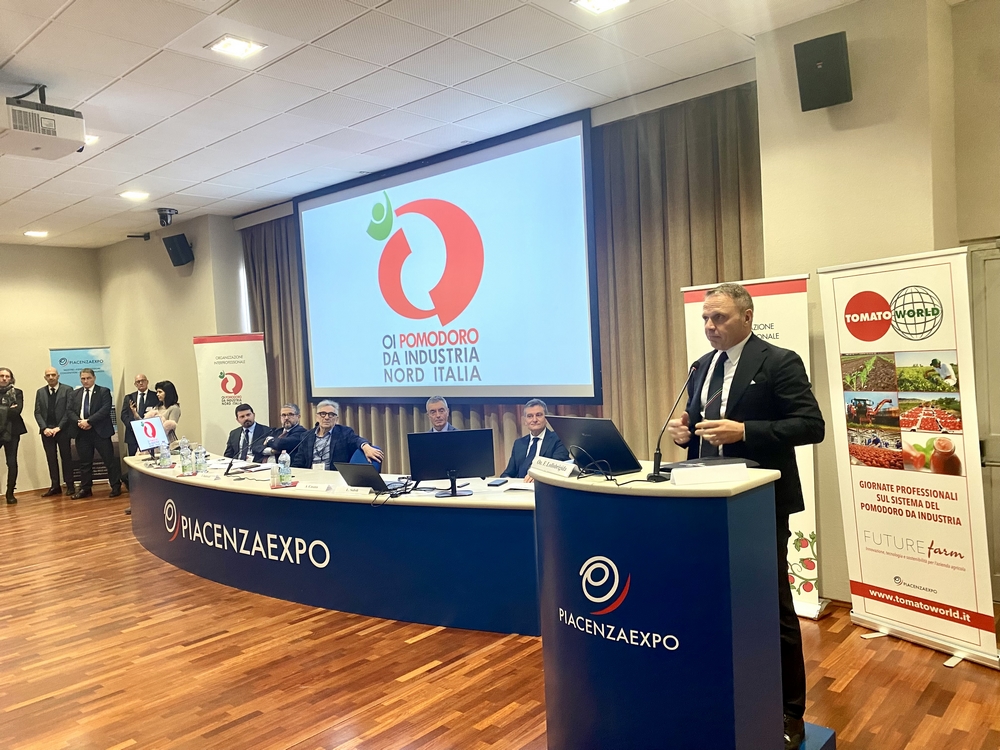 Ministers, European parliament members and the Emilia-Romagna Region in dialogue with the Interprofession on the instances proposed by the processing tomato supply chain to thwart the import into the EU of tomato derivatives that do not meet the sustainability standards required of similar European productions.
Ministers, European parliament members and the Emilia-Romagna Region in dialogue with the Interprofession on the instances proposed by the processing tomato supply chain to thwart the import into the EU of tomato derivatives that do not meet the sustainability standards required of similar European productions.
Mandatory origin marking of tomatoes, adoption of the principle of reciprocity of trade rules for imported products, approval of the European directive on Corporate Sustainability Due Diligence for the agro-food sector are some of the proposals presented during the conference at Tomato World in Piacenza.
On Thursday, Feb. 15, on the first day of Tomato World 2024, professional days for processing tomatoes, the conference "Tackling the processed tomato import into Europe that do not meet European sustainability standards: A proposal from the Italian processing tomato chain", was organized by the Interbranch Organization for processing tomato of Northern Italy to introduce to the institutions a series of essential initiatives to curb the commercialization in Europe of tomato derivatives from countries that produce below the minimum requirements of environmental and social sustainability.
Speakers at the conference included Minister of Agriculture Francesco Lollobrigida, Vice-Minister of Enterprise and Made in Italy Valentino Valentini, Members of the European Parliament Herbert Dorfmann, Sabrina Pignedoli, Paolo De Castro, and Emilia-Romagna Region Agriculture Councillor Alessio Mammi.
A proposal from the Italian processing tomato chain
Italian and European processing companies together with producers' organizations guarantee consumers the highest quality tomato derivatives which are environmentally and socially sustainable. Nevertheless, in recent years, particularly in 2023, some extra-EU countries have greatly increased the export of derivatives to international and European markets: as they do not have to meet certain sustainability parameters in the production, they are able to offer their products at lower prices. The Italian processing tomato supply chain, in order to oppose such unfair competition, which results in loss of profitability for the industry and the farmers, has proposed to the institutions actions to be taken at national and international level to protect the supply chain and enhance the qualities of the Italian and European product.
Antonio Casana (Anicav representative and President of the Tomato Europe Sustainability Committee) on behalf of the processing industry and Luigi Sidoli (Vice President Interbranch Organization for processing tomato of Northern Italy) representing the agricultural production, presented the content of the proposal, pointing out that concentrates, peeled tomatoes, pulps and purees, that can be found in Italian supermarkets, are obtained from 100% Italian and sustainable tomato, while the problem arises downstream in the supply chain, when in Europe other companies may use semi-finished products, imported from non-European countries for second processing.
On the national level, the supply chain proposes to promote an information campaign that clarifies to consumers that Italian tomato derivatives are 100% made in Italy and that the legislation in Italy requires transparency and origin marking of tomato on the label, as well as it calls for speeding up the adoption of tools for verifying and controlling the origin of tomato in products.
On the European level, moreover, the supply chain appeals for the extension to other countries of the obligation to indicate the origin of tomato in the products in which this ingredient plays a major role; for the adoption of the principle of reciprocity of trade rules for imported products; for the approval of the European directive on Corporate Sustainability Due Diligence, particularly for the agri-food sector; for the regulation and standardization of environmental and social sustainability indicators on food products; for greater support for European tomato producers with coupled aid; and for the adoption of new genomic techniques to improve tomato crops.
The response of the institutions
Francesco Lollobrigida, Minister of Agriculture, Food Sovereignty and Forestry:
"Our food excellence, such as our tomato, one of the symbols of food sovereignty, has quality as its hallmark, and our producers must be assured of a system based on fair competition. We need to help our farmers to work to secure them an income. To do this, we cannot intervene by forcing them to follow endless bureaucratic procedures that lead to increased production costs and to imports from nations that can sell at significantly lower prices."
Paolo De Castro, Member of the European Parliament: "After 30 years of investment, in which the European Union has led our agri food supply chain to be unequalled in the world in terms of quality, food sustainability and respect for workers' rights, the current legislature has given the impression of a Europe that is the enemy of farmers. On the contrary, the EU Parliament has been able to listen to our rural communities, taking on board the demands of the most strategic supply chains, such as those presented today in support of the processing tomato sector in Northern Italy, and bringing home decisive results: from the new regulation on new genomic techniques (now blocked by member states), to the new protection and promotion scheme for Geographical Indications. Only through this level of collaboration between operators and institutions the Union can return to accompanying our farmers toward increasingly sustainable and competitive production systems."
Herbert Dorfmann, Member of the European Parliament: "The international trade market must be free, but fair as well. The constant raising of sustainability standards required of farmers, which increases commitment and costs, however, makes it increasingly difficult to implement a fair market, especially if the same sustainability standards are not required of everyone. This is something we definitely need to work on at the European level."
Valentino Valentini, Vice-Minister for Enterprise and Made in Italy: "The Italian tomato processing sector represents an excellence of the Italian agri-food industry both in terms of turnover and quantity produced, and the government is attentive to strengthening the sector's competitive position. We want to be there alongside you in protecting 'red gold' through a concrete commitment that supports and enhances the production chain and adequately protects the reputation of products that represent us in the world. A first important signal of consideration was the establishment of a permanent discussion table of the agro-industrial sector, chaired together with Masaf (Ministry of Agriculture, Food Sovereignty and Forestry). We then know how essential it is to defend the sector's products from the countless attempts of commercial counterfeiting, but also from 'food counterfeiting'. It is therefore important to communicate the quality of our products and to tackle the phenomenon of Italian sounding and all those forms of imitation that damage our specialties. Strengthening the competitiveness of the sector also requires action to combat unfair competition phenomena: the CSDD (Corporate Sustainability Due Diligence Directive), which aims to counter the importation and distribution of products from countries that do not respect human rights and the environment, may be a first step, and the government is paying close attention to achieving the optimal cost-benefit balance."
Sabrina Pignedoli, Member of the European Parliament: "I care about the agri-food chain in my region, Emilia-Romagna, and I believe it is necessary to team up as Italy to protect the import into Europe of tomato derivatives that do not meet the same sustainable standards required of EU producers. Regarding the Corporate Sustainability Due Diligence legislation, enterprises have to be diligent from both the environmental and the workers' protection point of view. I believe that this is not a constraint, but an added value. Farmers, in fact, are not against green, because they are the first to deal with climate change, so they must be the first ally in a progressive improvement of the environmental situation.”
Alessio Mammi, Emilia-Romagna Regional Councilor for Agriculture: "Reciprocity is an issue of coherence. You cannot demand certain standards from European producers and then let the same standards not be applied on products coming from other non-EU countries. We are for food safety, with clear rules applied for everyone, for the good not only of our supply chain, which has a strategic value for the region and the country, but also for greater transparency towards citizens."
Tiberio Rabboni, President Interbranch Organization for processing tomato of Northern Italy: “I thank the institutions for attending the conference and for their interest in our proposals. I hope that soon these actions will be implemented for the sake of the supply chain and the 'Made in Italy'."
Data from the Italian processing tomato supply chain
- 115 first processing enterprises
- 36 tomato producers' organizations
- 35,000 workers among permanent and seasonal employees
- It represents 50% of European production and 15% of world production
- 5.4 million tons produced annually, of which 3.3 million are for export
- 4.4 billion € in turnover, of which 2.5 billion comes from exports
Sources: OI Pomodoro Nord, OI Pomodoro Centro-Sud

Attached documents: the official position papers, in Italian and in English, established jointly by the Interprofessional Organizations of Processed Tomatoes of the North and Central-South of Italy.

































